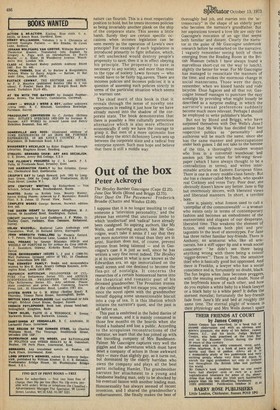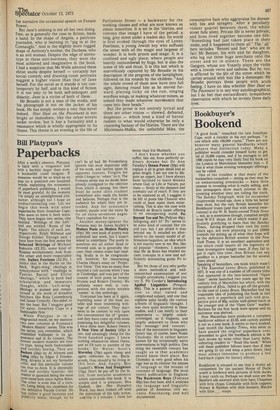Out of the box
Peter Adixoyd
The Heyday Bamber Gascoigne (Cape £2.25). Jane Dee Wells (Blond and Briggs £2.75). Star Dust On The Pavement Frederick Broadie (Chatto and Windus £2.00).
I suppose that it is no longer insulting to call someone a 'television personality,' and the phrase has entered that unctuous limbo to which 'intellectual' and 'radical' have already been consigned. So aspiring authors, like Ms Wells, and maturing authors, like Mr Gas coigne, won't take it amiss if I say that they are more notorious on visual than they are in print. Stardom does not, of course, prevent anyone from being talented — and in Gascoigne's case it is just as well, since he has written a very fine novel indeed. The Heyday is at its sunniest in what is now known as the 'Edwardian era, an age immortalised on the small screen and one destined to become the flea-pit of nostalgia. It concerns the researches of a certain homosexual baron into the theatrical and romantic past of his deceased grandmother. The Proustian ironies of the celebrant will not escape you, especially since the novel opens with the grandmother herself dipping some unmentionable biscuit into a cup of tea. It is this libation which initiates the narrator's quest, and the past is all before us.
This past is enshrined in the faded diaries of the old woman, and it is mainly consumed in those few months on the boards when she found a husband and lost a public. According to the scrupulous reconstructions of the' narrator, we learn that she has joined up with the travelling company of Mrs BandmannPalmer. Mr Gascoigne captures very well the giggles and the adventures which must have beset a company of actors in those awkward days — more than slightly gay, as it turns out, but dominated by the elderly harridan who owns the company and plays all the best parts: including Hamlet. The grandmother narrates her attachment to a young and handsome leading man, only to be shocked by his eventual liaison with another leading man. Homosexuality has always seemed of recent invention, and I shared the grandmother's embarrassment. She finally makes the best of thoroughly bad job, and marries into the 'actressocracy" in the shape of an elderly peer who becomes the narrator's grandfather. But her aspirations toward a love life are only the Gascoigne's evocation of an age that seems both familiar and distant. Clearly the narra tor in the guise of Mr Gascoigne undertook research before he embarked on the narrative.
I vaguely remember seeing both of them emerging from the Reading Room at the British Museum (which I have always found a marvellous short-cut on the way to lunch), slightly the better for wear. For Mr Gascoigne has managed to resuscitate the manners of the time, and evokes the enormous change in social mannerisms. Those were the days, remember, when we kissed hands and rode bicycles. Ehue fugaces and all that rot. Gascoigne himself manages to puncture the easy nostalgia by providing what might loosely be described as a surprise ending, in which the narrator's sexual preferences suddenly become much more relevant. Perhaps I should be employed to write publisher's blurbs.
But not by Blond and Briggs, who have surpassed themselves with Dee Wells's Jane.I assume that Ms Wells has decided that her respective publics as 'personality' and authoress will be much the same, since she has the same manner and preoccupations under both guises. I did not take to the heroine of the title, a thoroughly modern woman who lives in a converted warehouse and smokes pot. She writes for left-wing newspaper (which I have always thought to be a contradiction in terms), and writes interminable articles on Eastern European films. There is one in every middle-class family. But she has a cleaner called Mrs Bush, who speaks real Cockney and votes Tory. Poor dear, she obviously doesn't know any better. Jane is flip but enormously sincere, with liberated views and liberated manners. In short, a terrible , bore. Jane is, plainly, what Jonson used to call a 'caterpillar of the commonwealth' — a woman who exists only in terms of contemporary fashion and becomes an embodiment of the mannerisms and slogans of our desperate, liberated time. This weakens the element of fiction, and reduces both plot and protagonists to the level of stereotypes. For Jane has three rather familiar boy-friends. There is Anthony, an aristocrat who, like all aristocrats, has a stiff upper lip and a weak social conscience: "he didn't see there being anything wrong with there being a colour 'nigger-brown.". There is Tom, the sensitive thief who is basically good but oppressed. And there is Franklin, a lawyer who has a social conscience and is, fortunately no doubt, black. The fun begins when Jane becomes preggers, with the ensuing swelling and doubt. None of the boyfriends know of each other, and how do you explain a white baby to a black lawyer or a black baby to a white peer? It defies the sternest moralist; fortunately the boy-friends fade from Jane's life and bed at roughly the same time. The eternal plight of women IS their phYsiology and Mrs Wells doesn't spare
her narrative the occasional speech on Female Power.
But Jane's undoing is not all her own doing. Fate, as is generally the case in fiction, lends a hand. In the shape of Angela, a patrician journalist, who is learning to "pig in at the Connaught." And in the slightly more rugged shape of Anthony's mother, the Duchess, who is an evil woman. Despite the edge of stereotype in these anti-heroines, they were the most achieved and imaginative in the book. I had a suspicion that Ms Wells admired these elitist snobs despite herself — certainly her social comedy and drawing-room portraits suggest a higher vision than that of Jane herself. For the novel as it stands is too contemporary by half, and in this kind of fiction it is too easy to be both self-indulgent and didactic. Jane is a victim of both of these.
Mr Broadie is not a man of the media, and his photograph is not on the jacket of his book. He has simply written a very fine novel indeed. Star Dust on the Pavement is not bright or immediate, like the other novels under review, but it has a formality and a resonance which is wholly appropriate to its theme. This theme is an evening in the life of
Parliament Street — a backwater for the working classes and what are now known as ethnic minorities. It is set in the 'thirties, and conveys that image I have of the period: a long, grey street under a leaden sky. Its world is first evoked through the eyes of Lenny Pearlman, a young Jewish boy who suffuses the street with all the magic and largesse of wonder. It is both prison and stage. It is a confined and ugly place, where people are heavily outnumbered by bugs, but is also the scene of life and ritual. It is this last which is marvellously captured by Mr Broadie in his description of the progress of the lamplighter, followed on his rounds by the children: "And the whole crowd of them now hove into full sight, dancing round him as he moved forward, playing ticky on the run, singing wordless songs, or making whatever noises, as indeed they made whatever movements that came into their heads."
But the prose is not entirely lyrical and there are other voices — shrewd, defeated, desperate — which lend a kind of heroic realism to what would otherwise be only a charming fantasy of the'thirties. There are the Mittlemans-Malka, the unfaithful Mike, the
consumptive Sam who aggravates his disease with lies and savagery. After a peculiarly violent quarrel between them, the whole street falls silent. Private life is never private, and lives lived together become one life:. "Something had just taken place in their midst, and it happened to them all." The ' all ' here includes "Bennet and Son" who are in fact Mr Bennet, his wife and fat daughter, who lug out three huge armchairs onto the street and sit in silence. There are the Gangers, whose son Yosselly plays the violin with a Jewish verve and sadness. But he, too, is afflicted by the life of the street which he carries around with him like a distemper. Mr Broadie portrays these people with acuee feeling. 1 have no idea whether Star Dust on The Pavement is in any way autobiographical, but I do feel that extraordinary, sympathetic observation with which he invests these daily lives.



































 Previous page
Previous page